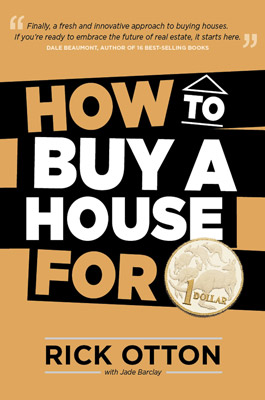How To Buy a House For $1

How To Buy a House For $1
Despite the slow economy it's never been easier to buy and sell property in Australia-if you have some loose change you can become a proud property owner or investor, that's the message from real estate expert Rick Otton, author of the new book, How To Buy a House For $1.
Under the current way of bank financing, many first time home buyers can't afford to purchase a property, even with government grants and concessions. Sellers are unable to achieve their sales price as banks have pulled back on their lending, making it increasingly difficult to borrow. Negative gearing has been the preferred property investing strategy, yet why are Australia, New Zealand and Canada the only three countries in the world who use it for tax benefits?
In the new book, How to Buy a House For $1, author Rick Otton lays out proven strategies that solve these current problems, empowering buyers and sellers about alternative finance options that don't involve banks. With over 20 years' experience, Rick has bought hundreds of properties using these strategies that work for anyone - in any location (even cities) and any market cycle. And best of all, Rick says you do it without risking any of your own money.
So, if you're like thousands of other Australians looking for a new way to build wealth through real estate without being limited by cash, credit or experience - this book is for you! Using this book you can not only realise your dream of financial independence, but you can find your very own dream property. There are so many home and land packages available, it'd be a shame to pass up this amazing opportunity.
Sydney-based Rick Ottonis a self-made multi-millionaire real estate consumer advocate, property investor and speaker. He is founder and director of We Buy Houses Pty Ltd and buys, sells and trades property, using little or none of his own money, and structures his transactions to create positive cash flow. Since 2001 Rick has privately taught over 35,000 students how to buy, sell and trade residential property without getting bank loans or acquiring debt, using little cash and minimising risk. He has been featured on A Current Affair, Today Tonight, Hot Property, as well as in numerous magazine and newspaper articles.
How To Buy a House For $1
We Buy Houses
Author: Rick Otton
ISBN: 9780646518923
Price: $24.95
Selling? How To Find More Buyers Without Discounting Your Property
With recent interest rate cuts, housing affordability in Australia has improved for the fifth straight quarter, yet property owners continue to drop their prices dramatically in order to make a sale. But do they really have to? Property investment strategies, Rick Otton, believes there are ways to sell, and get the price you want.
By applying creative strategies to real estate transactions - strategies that are successful in other forms of business - a whole new set of options emerge. And their outcomes focus on selling for your ideal price - not discounting to what real estate agent jargon says is 'meeting the market'.
So, how do you find more buyers without lowering your price?
Well, the first step is to change your mind set about how real estate transactions take place - removing from the scenario the real estate agent (unless he or she embraces and facilitates these strategies), along with the banks.
Removing The Hurdles: Make Your Property Easy To Purchase
It's all about convenience - where the banks may put obstacles in the way of potential borrowers and make property hard to buy, you, as a seller, need to make your house easy to buy. Consider:
For someone to purchase a modest home in Melbourne for, say $500,000, they would need a 20% deposit - $100,000 - plus around $23,000 for Stamp Duty and Legals. That is a lot of money for a buyer to have saved - and even if they have it, there other hoops that they need to jump through for the banks.
They will need to prove, among other things, a good credit history, consistent savings record, and reliable employment - the self-employed are at a real disadvantage here. But the biggest hurdle is that huge deposit.
However, consider the scenario:
Your buyer has a modest deposit, say $20,000 and has the demonstrated income that would allow him or her to meet the repayments that you agree upon - the rest of the deposit can be paid at a later, nominated, date.
By making the terms convenient and attractive, you will have more buyers interested in your property, and this increased demand holds, or improves the value of your property, regardless of the economic situation.
Create A Bargain - Not A Lower Price
The word 'bargain' means different things to different people, but it almost always relates to a problem they need to solve with as little financial outlay as possible. In the case of real estate, a bargain might be lower than usual interest rates to kick off a loan, or the ability to spread a deposit over several payments.
Understanding what your buyers are looking for, not so much with regard to the features of a property, but instead how the purchase fits with their financial circumstances, will help you to create a 'bargain' that is right for them.
By creating your bargain around flexible terms that work for you and solve the problems of potential buyers (for instance lack of deposit, no credit history), your property will appeal to a much wider market.
Getting your message to your market also needs some creative thinking, and being 'different' in your approach. If you have created a bargain, using expensive techniques to market it won't work.
Mr Otton has been using these strategies for almost 30 years, and teaching them to his students for over 10 years - so it's safe to assume that he knows about marketing real estate in this fashion.
"A hand-written sign outside a property spells Bargain in anyone's language" he says. "It also says No Agent Commission and Deal Direct With Owner - but, most importantly, it grabs more attention than any large, realtor's sign - people driving past will slow down to see what the sign says."
"If you are offering seller financing or a deposit lower than normal - put it on the sign. Your sign must clearly identify your Bargain Offer."
In his new book "How To Buy A House For A Dollar" Mr Otton discusses these and his other creative strategies for buying and selling real estate, and growing a profitable property investment portfolio.
Interview with Rick Otton
Question: Why did you choose to share your knowledge of buying houses with Australians?
Rick Otton: I'm leading a movement of like-minded people who want to seize the opportunity for home ownership in a new way. I want to share my knowledge with Australians and empower people to transform the way they buy and sell properties, so that they can actually start to get what they want.
Question: What are the common mistakes begins make when buying property?
Rick Otton: The most common mistake I see is that a person did not understand why they were buying the property in the first place and what their exit strategy was. How to avoid this common mistake is to ask yourself whether you're buying a property for emotional or logical reasons. There is no right or wrong answer to this question. You just need to be very clear about this before you buy. I teach my students that you must know your exit strategy before you go into the entrance of any property transaction. Before you buy you must know the answers to these four questions to get clarity; Do you plan to live in it? Is it an investment property? Is it for long-term capital growth? Is it for cash flow?
Question: What trends are we currently seeing in the housing sector?
Rick Otton: The old systems are now outdated. For years we've been trying to solve new problems with old systems. The fact of the matter is that traditional systems are falling apart all around us - they may have gotten us this far, but they never really worked that well in the first place. And no matter how good or bad things are with your personal situation, there's never been a better time to start using some more efficient systems to buying and selling houses.
Question: Can we really buy a house for $1?
Rick Otton: It is a fact that Luna Park, ABC learning centers, TV Guide even a Darlinghurst Dunny Lane were sold for $1.
And the way this was done is by transferring debt from one company to another for a dollar. Why charge a dollar or a pound? Because it shows that 'some consideration' has been paid. It could be any sum, as long as it shows that something of value has been handed over in payment. So if companies move debt around for a dollar when they buy and sell each other, why can't we apply the same process, systems and formulas to houses?
We can! Here's how it works. They're transferring the debt to the new owner, and the asset goes with it. And they pay the one-dollar fee to stick the paperwork together. The company is sold for a dollar, and the new owner takes over the old debt. It's much easier to transfer the debt and the assets to a new owner than it is to set up a new company from scratch. Especially in times when banks aren't giving out new loans very readily.
Companies, in one respect, are just like houses - they're made up of a cash bit and a debt bit. And, just like houses, nobody wants to keep the debt bit. They only like the cash bit. So the old owner moves the debt bit across the table to its new owner, and they seal the paperwork with a buck.
Question: What's the first piece advice you'd give someone looking to purchase their first property?
Rick Otton: The profit is in the terms not in the price. Most buyers aren't happy to pay the full price, because at the back of their mind there's a quiet little voice saying, 'Pay less for cash'. So, thinking that cash is the only way they can pay, and price is the only variable, they have no choice but to lowball. But if we take price out of the equation and replace it with convenience then it is all in the terms.
What you do is really only limited by your imagination and the problems you're trying to solve. To open your mind to what's possible when you change the terms instead of the price, here is a short list of some of the terms that my students and I have changed in real transactions, with real people and real properties:
Little or no deposit
Reduced interest rates lower than mainstream lenders
Pay off the deposit in installments instead of up-front
Rent now, credited to purchase later
House and car package
House and furniture package
Discount the buyer's interest rate, not the house price
'Sweat equity' (the 'handyman special') - do a renovation as a deposit
Pay installments to the seller instead of to the bank
Stamp duty paid by the seller not the buyer
Interview by Brooke Hunter
MORE





